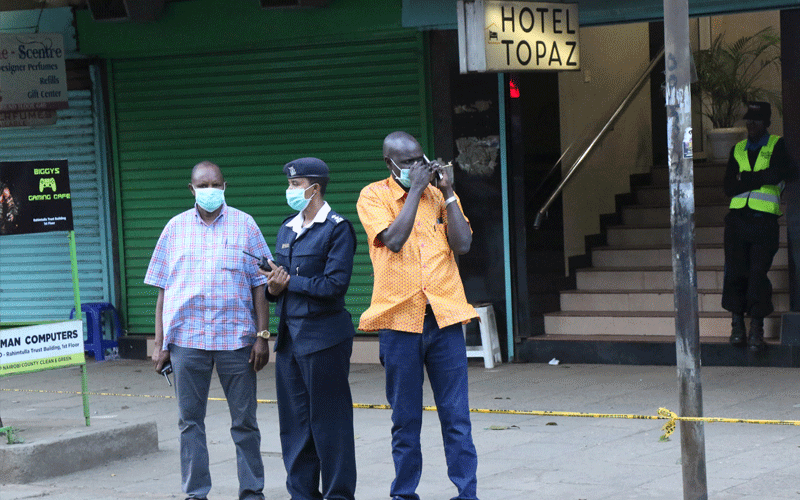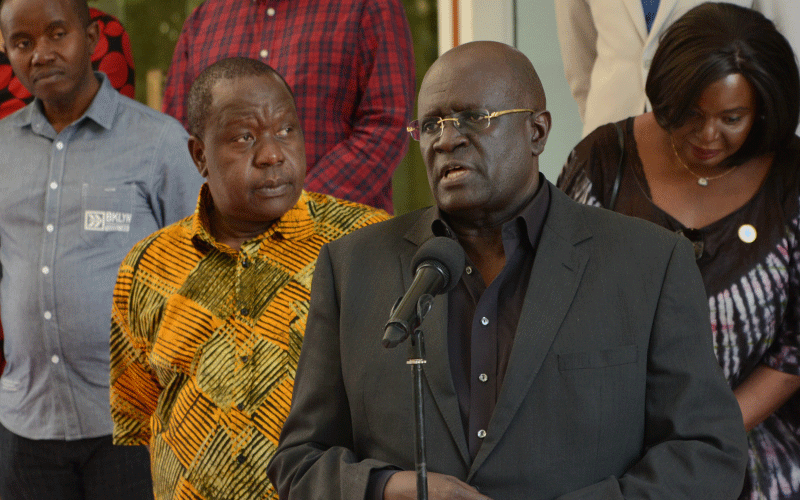Schools shut, travel restricted in measures to tame Covid-19
By Mercy Mwai, March 16, 2020Mercy Mwai @wangumarci
The growing threat of the coronavirus in Kenya hit home yesterday when President Uhuru Kenyatta last evening announced a raft of measures to combat the virus, including the closure of all learning institutions.
The Head of State also confirmed that the country had registered two more Covid-19 cases.
The new cases, which bring to three the infections in the country, were detected after testing of the 27 people who had come into close contact with first case. They are under isolation at the Kenyatta National Hospital, where they are receiving treatment.
The President made the revelations as other arms of government such as the Judiciary announced it would scale down the hearing of cases as well stop travel of its staff.
Yesterday, Kenyans in various places woke to the reality of the severity of the deadly respiratory flu that has claimed more than 5,000 lives across the world, when they were forced to go undergo stringent screening procedures at churches, shopping malls, public transport and other social places.
Announcing the measures, among them the suspension of travel, the President fell short of declaring a total lockdown to contain the virus.
“We have suspended learning in all our education institutions with immediate effect.
Consequently, and to facilitate a phased approach, primary and secondary day schools are to suspend operations from tomorrow (Monday),” the President said in a statement outside his Harambee House office, Nairobi yesterday.
Uhuru said the phased-out closure of schools begins today starting with day primary and secondary schools. Boarding schools and universities will close on Wednesday and Friday, respectively.

Following the President’s directive, Education Cabinet Secretary George Magoha said the ministry will today issue a circular on the closure of schools.
Besides ordering the immediate suspension of learning activities, the President also said the government has banned all travels of people into the country from countries with reported corona-virus cases.
This directive, he said, will take effect within the next 48 hours to cater for any passengers who may be en-route and will remain in effect for the next 30 days or as varied by the National Emergency Response Committee.
“Only Kenyan citizens, and any foreigners with valid residence permits will be allowed into Kenya provided they proceed to self-quarantine or to a government facility,” directed the President.
He also ordered all persons who have come to Kenya in the last 14 days to self-quarantine, saying the measures announced by the government were aimed at preventing the spread of the virus that originated in Wuhan, China.
“ I have been getting briefs from the ministry of health and the first patient is doing very well. The government is looking after her well.
I would want to assure you that the government will ensure that it takes care of any patient who comes with contact with the disease,” said the President.
The Head of State asked government and companies to allow employees to work from home except those dealing with essential services even as he encouraged Kenyans to use cashless transactions such as mobile money transfer and credit cards to avoid contamination.
He appealed to banks to reduce the cost of mobile transactions, especially during this time when the country is facing the crisis.
Hospital visits
In the same vein, the President appealed to Kenyans to avoid congregations such as weddings, funerals, avoid shopping malls and minimise congestion in public transport. Kenyans are also urged to limit hospital visits to tame the spread of the virus.
“In line with the directive to avoid crowded places, citizens are encouraged to, avoid congregating including in places of worship, minimise attendance to social gatherings including weddings and funerals, and restrict the same to immediate family members,” he added.
He also encouraged malls, companies and other public spaces to provide water, soap, sanitisers and ensure regular cleaning to disinfect the spaces.
While assuring Kenyans that the government was working round the clock to control the spread of the disease, Uhuru also warned traders against hoarding commodities as well hiking their prices, saying they will face the full force of law.
The Competition Authority of Kenya, he said, will be checking for compliance
The President asked Kenyans to bear with the steps to fight coronavirus, while acknowledging some of the measures may cause inconvenience.
“This pandemic will test us, as it is testing all countries in every corner of the world, but I do not believe it will defeat us. If we pull together, and everybody does their part, we shall overcome its worst impacts,” he added.
The President issued the new guidelines only hours after National Council for Administration of Justice led by Chief Justice David Maraga temporarily suspended the hearing of civil cases across the country effective today as the reality of the deadly coronavirus. In line with this, prisoners and remandees will not be presented to court.
On new arrests, the CJ said all cases, except serious ones will be dealt with at the police stations in accordance with guidelines to be issued by the Inspector General of Police, Hillary Mutyambai.
Last Friday Health Cabinet Secretary Mutahi Kagwe said the first case, a Kenyan citizen, who had flown in from Ohio, USA, via London to Nairobi, tested positive last week.
The patient has since been isolated at Mbagathi Hospital in Nairobi, including 27 others she had been in contact with.
“The government has taken preventative measures and is monitoring the patient… who is stable,” said CS Kagwe said on Friday.
The CS further asked people suffering from cough and sneeze and those with difficulty in breathing to stay at home, as a preventive measure to curb the spread of the disease.
All 27 people who came into close contact with ‘patient 0’ have also been tested for the virus at the National Influenza Centre.
